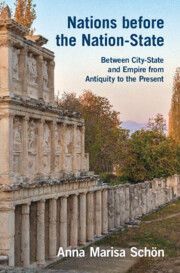Book contents
- Nations before the Nation-State
- Nations before the Nation-State
- Copyright page
- Contents
- Acknowledgments
- 1 Introduction
- 2 What Is a Nation? A Brief Historiography of Theories of the Nation
- 3 A Tale of Two Fatherlands
- 4 Post-Roman Transitions
- 5 Medieval Imperialism
- 6 Nationality and the Medieval “State” in France
- 7 The Nation at a Crossroads
- 8 Conclusions
- Bibliography
- Index
5 - Medieval Imperialism
National Diversity and Universal Order
Published online by Cambridge University Press: 14 November 2024
- Nations before the Nation-State
- Nations before the Nation-State
- Copyright page
- Contents
- Acknowledgments
- 1 Introduction
- 2 What Is a Nation? A Brief Historiography of Theories of the Nation
- 3 A Tale of Two Fatherlands
- 4 Post-Roman Transitions
- 5 Medieval Imperialism
- 6 Nationality and the Medieval “State” in France
- 7 The Nation at a Crossroads
- 8 Conclusions
- Bibliography
- Index
Summary
Chapter 5 offers a probing survey of late reflections on nationhood in the context of the German Empire, focusing on Engelbert of Admont, Dante Alighieri, and Marsiglio of Padua. By 1300, radical changes to the political landscape – especially the curtailing of imperial power and the rise of independent territorial kingdoms – prompted medieval thinkers to rethink and refine the principles of political order, resulting in two broad currents of thought: renewed imperialism and defenses of territorial monarchy. Medieval proponents of empire, despite their different argumentative approaches and strategies, treat a number of similar problems: the source of imperial authority, the end and purpose of world government, and the legitimacy of the empire’s claim to universal rule, that is, over all nations of the world. While Engelbert and Dante aim to reconcile national pluralism and political unity through some variant of legal pluralism, Marsiglio suggests that the various national communities that are part of the empire have to consent to imperial rule, offering explicit normative criteria for multinational politics.
Keywords
- Type
- Chapter
- Information
- Nations before the Nation-StateBetween City-State and Empire from Antiquity to the Present, pp. 103 - 130Publisher: Cambridge University PressPrint publication year: 2024

